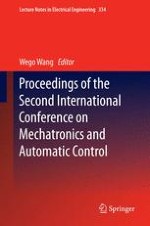2015 | OriginalPaper | Buchkapitel
61. An Improved Shuffled Frog Leaping Algorithm to Optimize the Parameters of PID
verfasst von : Yueting Liu
Erschienen in: Proceedings of the Second International Conference on Mechatronics and Automatic Control
Aktivieren Sie unsere intelligente Suche, um passende Fachinhalte oder Patente zu finden.
Wählen Sie Textabschnitte aus um mit Künstlicher Intelligenz passenden Patente zu finden. powered by
Markieren Sie Textabschnitte, um KI-gestützt weitere passende Inhalte zu finden. powered by
